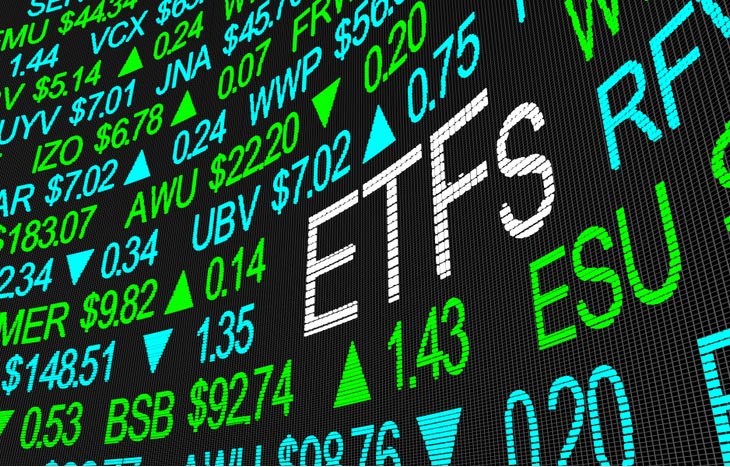ETF Definition: What is an Exchange-Traded Fund?
Exchange-traded funds (ETFs) have become extremely popular in recent years. With more than 5,000 ETFs trading globally, you can assemble a portfolio of ETFs that invests in almost anything, anywhere. Continue reading to see a full ETF definition. But first, here is a brief summary of the benefits that ETFs provide:
- On average, ETFs have lower maintenance fees than mutual funds.
- You can buy ETFs at any time throughout the trading day, just like common stocks.
- They are typically less risky than individual stocks.
- investment areas include bonds, currencies, equities, commodities and real estate.
- ETFs have a lower capital gains tax and thus are typically more tax efficient
ETF Definition: What is an ETF?
An exchange-traded fund (ETF) is a type of investment product that pools money from many investors and invests it according to the fund’s stated objective. ETFs usually invest in a large portfolio of securities, providing an investor with instant diversification when they purchase shares.
An ETF can be active. This means securities in the fund buy and sell at the fund manager’s discretion. However, it can also be passive, meaning the fund seeks to replicate the performance of an already-established benchmark such as a stock or bond index.
ETFs look, feel and trade like stocks. And like a stock, the price of an ETF changes throughout the day. You can buy and sell ETFs in your brokerage account at the click of a mouse. And today, at most brokerages, you can invest in ETFs for free.
Equity and Debt ETFs
ETFs are further defined as being equity-focused, debt-focused, or as some sort of blend.
Equity ETFs invest in the individual stocks of publicly-traded companies. These companies can be located here in the U.S., or abroad. Equity ETFs seek to provide profits to their investors by buying stocks that increase in value, or stocks that provide income in the form of dividends.
Debt ETFs invest in bonds and other debt securities. These types of funds are generally less aggressive than equity ETFs, but the level of security these funds present can vary depending on the credit quality of the issuer of the bond. Debt-focused ETFs seek to provide profit in the form of interest that the bonds in the fund periodically pay.
ETFs vs Mutual Funds?
Mutual funds and ETFs share major similarities – mainly the concept of pooling and investing the money of many investors. There are also some key differences, though.
ETFs are “closed-end”, meaning that there is only one offering of shares. After this IPO or “initial public offering”, the shares are traded on exchanges – much like individual stocks. Like stocks, ETF share prices fluctuate during the trading day. The price of an outstanding ETF share is determined by supply and demand – regardless of the underlying value of the assets in the fund.
Mutual funds are “open-end”. This means that the fund company constantly offers new shares to investors. If a shareholder wishes to sell the shares, they redeem them with the fund company, rather than selling them to another investor. Mutual fund prices are usually calculated only once per day, and the price is based on the value of the fund assets.
ETFs definitely offer some distinct advantages over traditional mutual funds. You can trade ETFs as easily as you buy and sell shares of a stock.
Mutual funds trade after the market closes. ETFs trade whenever the markets are open and are much more flexible than mutual funds.
ETFs are also more afforable, transparent and require no investment minimums. You can invest in ETFs that offer leverage or even profit when markets go down. This has helped the ETF become extremely successful over the past 10-15 years.
How ETFs are Taxed
ETFs for the most part, have been known to be extremely tax efficient. Investors can hold shares in a taxable brokerage account or a retirement account such as an IRA.
In a taxable account, dividend and interest income from an ETF is taxable within the same year. When shares sell, any gain or loss from the sale faces taxation. If you do not sell the ETF within a year, you will have to pay a capital gains tax.
In a retirement account such as an IRA, all taxation is deferred until money is withdrawn from the account. This includes dividends and interest, as well profit from the sale of shares. Once you withdraw money from the account, however, it is fully taxable at the investor’s ordinary income tax rate.
Are ETFs a Good Investment?
If you are looking for sound advice in the arena of ETF investing…look no futher than ETF Expert Nicholas Vardy. Nicholas can help you grow your wealth with ETFs and help you along your path to financial freedom.
In this recent article, Nicholas breaks down his 4 portfolio offerings: Tactical, Strategic, Income and Endowment.
We hope this ETF definition has given you a better understanding of exchange-traded funds. For the latest and greatest ETF investing articles, sign-up for Liberty Through Wealth below.
[adzerk-get-ad zone="245143" size="4"]
About Ben Broadwater
Ben Broadwater is the Director of Investment U. He has more than 15 years of content creation experience. He has worked and written for numerous companies in the financial publishing space, including Charles Street Research, The Oxford Club and now Investment U. When Ben isn’t busy running Investment U, you can usually find him with a pair of drumsticks or a guitar in his hand.







